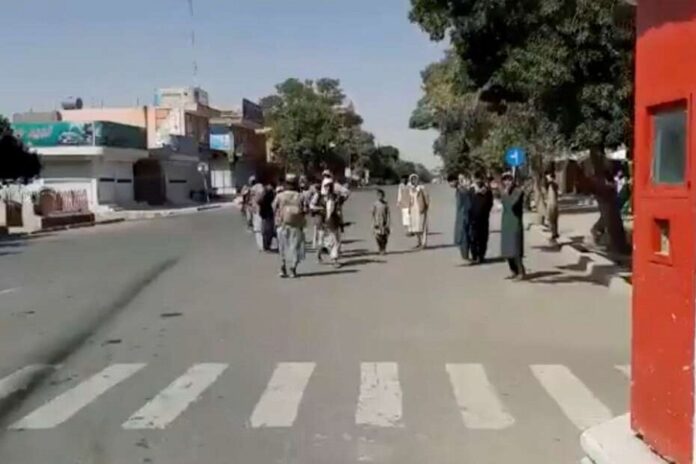Taliban insurgents tightened their grip on Afghanistan on Friday, wresting control of its second and third biggest cities while Western embassies prepared to send in troops to help evacuate staff from the capital, Kabul, according to Reuters.
The capture of the second-biggest city of Kandahar in the south and Herat in the west after days of clashes are a devastating setback for the government as the deadly Taliban insurgency turns into a rout of the security forces.
„The city looks like a front line, a ghost town,” provincial council member Ghulam Habib Hashimo said by telephone from Herat, a city of about 600,000 people near the border with Iran.
A government official told Reuters: „Following heavy clashes late last night, the Taliban took control of Kandahar city.”
Of Afghanistan’s major cities, the government still holds Mazar-i-Sharif in the north and Jalalabad, near the Pakistani border in the east, as well as Kabul. But a U.S. defence official cited US intelligence as saying this week that the Taliban could isolate Kabul in 30 days and possibly take it within 90.
In response to the Taliban advances, the Pentagon said it would send about 3,000 extra troops within 48 hours to help evacuate US embassy staff.
Britain said it would deploy about 600 troops to help its citizens leave while other embassies and aid groups said they too were getting their people out.
The United Nations has warned that a Taliban offensive reaching the capital would have a „catastrophic impact on civilians” but there is little hope for negotiations to end the fighting with the Taliban apparently set on a military victory.
The Taliban also captured the towns of Lashkar Gah in the south and Qala-e-Naw in the northwest, security officers said on Friday. Firuz Koh, capital of central Ghor province, was handed over without a fight, officials said.
The militants, fighting to defeat the government and impose their strict version of Islamic rule, have taken control of 14 of Afghanistan’s 34 provincial capitals since August 6.
HEAVY BLOW
The speed of the offensive has sparked recriminations among many Afghans over President Joe Biden‘s decision to withdraw US troops, 20 years after they ousted the Taliban in the wake of the September 11 attacks on the United States.
Biden said this week he did not regret his decision, noting Washington has spent more than $1 trillion in America’s longest war and lost thousands of troops.
Kandahar will be a particularly heavy blow to the government. It is the heartland of the Taliban, ethnic Pashtun fighters who emerged in the province in 1994 amid the chaos of civil war to sweep through most of the rest of the country over the next two years.
Government forces were still in control of Kandahar’s airport, which was the US military’s second-biggest base in Afghanistan during their 20-year mission, an official said.
Lashkar Gah is the capital of the southern opium-growing province of Helmand, where British, U.S. and other foreign forces battled the insurgents for years.
The U.S. State Department said Secretary of State Antony Blinken and Defense Secretary Lloyd Austin spoke to President Ashraf Ghani on Thursday and told him the United States „remains invested in the security and stability of Afghanistan”. They also said the United States was committed to supporting a political solution.
A Taliban spokesman told Al Jazeera: „We will not close the door to the political track.”
Pakistan officially denies backing the Taliban but it has been an open secret that Taliban leaders live in Pakistan and recruit fighters from a network of religious schools in Pakistan.
Pakistan’s military has long seen the Taliban as the best option to block the influence of arch rival India in Afghanistan.
Afghans, including many who have come of age enjoying freedoms since the Taliban were ousted, have vented their anger on social media, tagging posts #sanctionpakistan, but there has been little criticism from Western capitals of Pakistan’s role.


